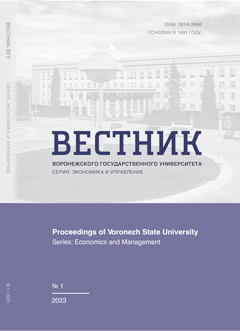Методологический хаос сценарного планирования
Аннотация
Предмет. Многообразие подходов к определению понятия «сценарное планирование» и методов его осуществления привело к так называемому «методологическому хаосу сценарного планирования», что создает сложности для его понимания и применения в практике стратегического управления.
Цель. Упорядочение накопленных знаний и снижение уровня методологического хаоса в области сценарного планирования для повышения его применимости в практике стратегического управления.
Методы. Исследование основано на применении общенаучных методов анализа, синтеза, обобщения при изучении и систематизации накопленного массива знаний в области сценарного планирования.
Результаты. Сценарное планирование представляет собой инструмент стратегического планирования, который целесообразно применять для изучения возможного будущего в условиях неопределенности среды. Авторами представлена систематизация понятий сценарное планирование и сценарий как его результат, определено оптимальное количество сценариев, необходимое для принятия стратегических решений с учетом ресурсозатратности разработки сценариев с одной стороны и необходимости избежания ловушки изучения различных аспектов одного и того же сценария с другой.
Выводы. В условиях нарастания неопределенности среды сценарное планирование, направленное на выявление альтернативных сценариев развития будущего, представляется предпочтительным методом исследования, поскольку способно обеспечить информационную поддержку принятия стратегических решений. В силу сказанного упорядочение накопленных знаний в данной области необходимо для науки и практики управления.
Литература
Börjeson, L., Höjer, M., Dreborg K.H., Ekvall, T., & Finnveden, G. (2006). Scenario types and techniques: Towards a user's guide. Futures, 38(7), 723-739. https://doi.org/10.1016/j.futures.2005.12.002
Bradfield, R., Wright, G., Burt, G., Cairns, G., & Van Der Heijden, K. (2005). The origins and evolution of scenario techniques in long range business planning. Futures, 37(8), 795-812. https://doi.org/10.1016/j.futures.2005.01.003
Burt, G., Wright, G., Bradfield, R., Cairns, G., & Van der Heijden, K. (2006). The Role of Scenario Planning in Exploring the Environment in View of the Limitations of PEST and Its Derivatives. International Studies of Management & Organization, 36(3), 50-76. https://doi.org/10.2753/IMO0020-8825360303
Curry, A., & Schultz, W. (2009). Roads less travelled: different methods, different futures. Journal of Futures Studies, 13(4), 35–60.
de Geus, A. (1997). The living company. Harvard Business School Press.
Dean, M. (2019). Scenario Planning: A Literature Review. https://doi.org/10.13140/RG.2.2.12629.24802
Durance, P. (2010). Reciprocal influences in future thinking between Europe and the USA. Technological Forecasting and Social Change, 77(9), 1469–1475.
Durance, P., & Godet, M. (2010). Scenario building: uses and abuses. Technological Forecasting and Social Change, 77(9), 1488–1492. https://doi.org/10.1016/J.TECHFORE.2010.06.007
Fahey, L., & Randall, R.M. (1996). Learning From The Future. Competitive Foresight Scenarios. New York, John Wiley & Sons, Inc.
Galtung, J. (1975). Essays in Peace Research. Christian Ejlers publ.
Godet, M. (1982). From forecasting to ‘La Prospective’: A new way of looking at futures. Journal of Forecasting, 1(3), 293-301. https://doi.org/10.1002/for.3980010308
Gordon, T.J., & Hayward, H. (1968) Initial experiments with the cross-impact matrix method of forecasting. Futures, 1(2), 100–116. https://doi.org/10.1016/S0016-3287(68)80003-5
Greeuw, S.C.H., van Asselt, M., Grosskurth, J., Storms, C., Rijkens-Klomp, N., Rothman, D.S., & Rotmans, J. (2000). Cloudy Crystal Balls. Copenhagen, European Environment Agency. Environmental issues series: 17.
Heinecke, A., & Schwager, M. (1995). Die szenario-technik als instrument der strategischen planung. Germany, Braunschweig: TU Braunschweig, Inst. für Wirtschafswissenschaft, Abt. Unternehmensführung.
Hewitt, M., Ortmann, J., & Rei, W. (2022). Decision-based scenario clustering for decision-making under uncertainty. Annals of Operations Research, 315(5), 747–771. https://doi.org/10.1007/s10479-020-03843-x
Jenkins, L. (1997). Selecting a variety of futures for scenario development. Technological Forecasting and Social Change, 55(1), 15–20. https://doi.org/10.1016/S0040-1625(96)00117-5
Johansen, I. (2018). Scenario modelling with morphological analysis. Technological Forecasting and Social Change, 126, 116-125. https://doi.org/10.1016/j.techfore.2017.05.016
Johnson, G., Scholes, K., & Whittington, R. (2011). Exploring Strategy: Text and Case Studies. UK: Pearson Education Limited
Jungermann, H. (1985). Psychological Aspects of Scenarios. Environmental Impact Assessment, Technology Assessment, and Risk Analysis. NATO ASI Series: 4. Springer, Berlin, Heidelberg. https://doi.org/10.1007/978-3-642-70634-9_13
Kahn, H., & Wiener, A. J. (1967). The year 2000: A framework for speculation on the next thirty-three years. London: MacMillan Publishing Company.
Khakee, A. (1991). Scenario construction for urban planning. Omega-international Journal of Management Science, 19(5), 459-469.
Kosow, H., & Gassner, R.J. (2008). Methods of Future and Scenario Analysis: Overview, Assessment, and Selection Criteria.
Lindgren, M., & Bandhold, H. (2003). Scenario Planning: the link between future and strategy. UK: Palgrave Macmillan.
Luther, D., & Ali, R. (2022). Scenario Planning: Strategy, Steps and Practical Examples.
Martelli, A. (2001). Scenario building and scenario planning: state of the art and prospects of evolution. Futures Research Quarterly, 17(2), 57-74.
Mason, D.H. (1994). Scenario-based planning: Decision models for the learning organization. Planning Review, 22(2), 6–11. https://doi.org/10.1108/eb054457
Mietzner, D., & Reger, G. (2005). Advantages and disadvantages of scenario approaches for strategic foresight. International Journal of Technology Intelligence and Planning, 1(2), 220–239.
Millett, S. (2003). The future of scenarios: challenges and opportunities. Strategy and Leadership, 31(2), 16–24. https://doi.org/10.1108/10878570310698089
Neumann, J. von (1928). Zur theorie der gesellschaftsspiele. Mathematische annalen, 100(1), 295-320.
Ogilvy, J. (1992). Future studies and the human sciences: the case for normative scenarios. Futures Research Quarterly, 8(2), 5–65.
Peterson, G.D., Cumming, G.S., & Carpenter, S.R. (2003). Scenario planning: a tool for conservation in an uncertain world. Conservation Biology, 17(2), 358-366. https://doi.org/10.1046/j.1523-1739.2003.01491.x
Pillkahn, U. (2008). Using Trends and Scenarios as Tools for Strategy Development. Publicis Corporate Publishing.
Porter, M. (2008). The Competitive Advantage: Creating and Sustaining Superior Performance. Weinheim, Wiley-VCH.
Ringland, G. (1998). Scenario planning: Managing for the future. UK: John Wiley & Sons.
Rotmans, J., & van Asselt, M.B.A. (1997). From scenarios to visions. A long way to go. Lessons learned from two decades scenario development. Open meeting of the Human Dimensions of Global Environmental Change Research Community, Laxenburg, Austria.
Schnaars, S.P. (1987). How to develop and use scenarios. Long Range Planning, 20(1), 105-114. https://doi.org/10.1016/0024-6301(87)90038-0
Schoemaker, P. (1995). Scenario Planning: A Tool for Strategic Thinking. Sloan Management Review, 36, 25-40.
Schwab, P., Cerutti, F., & von Reibnitz, U.H. (2003). Foresight – using scenarios to shape the future of agricultural research. Foresight, 5(1), 55–61. https://doi.org/10.1108/14636680310471299
Schwartz, P. (1996). The Art of The Long View: Planning for the Future in an Uncertain World. NY: Currency Doubleday.
Simpson, D.G. (1992). Key lessons for adopting scenario planning in diversified companies. Planning Review, 20(3), 10-48. https://doi.org/10.1108/eb054355
van Asselt, M.B.A. (2000). Perspectives on uncertainty and risk. In: Perspectives on Uncertainty and Risk. Springer, Dordrecht. https://doi.org/10.1007/978-94-017-2583-5_10
van der Heijden, K. (2005). Scenarios: The art of strategic conversation. John Wiley & sons.
van Notten, P. (2006). Scenario development: a typology of approaches. Think Scenarios, Rethink Education. OECD. https://doi.org/10.1787/9789264023642-en
van Notten, P., Rotmans, J., van Asselt, M., & Rothman, D. (2003). An updated scenario typology. Futures, 35(5), 423-443. https://doi.org/10.1016/S0016-3287(02)00090-3
Wilson, I. (2000). From Scenario Thinking to Strategic Action. Technological Forecasting and Social Change, 65, 23–29.
Zwicky, F. (1962). Morphology of propulsive power. Pasadena, CA: Society for Morphological Research.

Это произведение доступно по лицензии Creative Commons «Attribution» («Атрибуция») 4.0 Всемирная.























